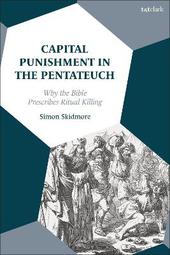
|
Capital Punishment in the Pentateuch: Why the Bible Prescribes Ritual Killing
Hardback
Main Details
| Title |
Capital Punishment in the Pentateuch: Why the Bible Prescribes Ritual Killing
|
| Authors and Contributors |
By (author) Dr Simon Skidmore
|
| Physical Properties |
| Format:Hardback | | Pages:232 | | Dimensions(mm): Height 234,Width 156 |
|
| Category/Genre | Biblical studies |
|---|
| ISBN/Barcode |
9780567707192
|
| Classifications | Dewey:222.106 |
|---|
| Audience | | Professional & Vocational | |
|---|
|
Publishing Details |
| Publisher |
Bloomsbury Publishing PLC
|
| Imprint |
T.& T.Clark Ltd
|
| Publication Date |
15 December 2022 |
| Publication Country |
United Kingdom
|
Description
Through the application of mimetic theory Skidmore examines the social impact of capital punishment upon the community, and explores the cathartic nature of this practice within key Pentateuchal texts. Skidmore shows how Mimetic theorists such as Girard advance a view that a community ravaged by vengeance and blood feuds may be saved from extinction by scapegoating one of their own. As the community select a common scapegoat, and vent their collective violence upon this person, peace and order are restored. Though an in-depth analysis of various passages, Skidmore reveals this process in key Pentateuchal texts concerning capital punishment. These observations suggest that biblical capital punishment may have functioned as a means of protecting the Israelite community by managing rivalry and violence.
Author Biography
Simon Skidmore studied for his PhD at the University of Queensland and teaches religion in the school system in Brisbane, Australia.
ReviewsSimon Skidmore's book provides a fresh reading of ritual killings in the Pentateuch. A careful application of Rene Girard's mimetic theory allows him to offer a more satisfying and a more robust reading of key passages in this part of the Bible than may be offered by alternative approaches. Human immolations are the outcome of a controlled release of violence to overcome mimetic rivalries, draw the community together and restore peace and order. The most important part of this book shows the illegitimate use of biblical texts by authors that try to justify capital punishment in today's USA. Skidmore also mentions what future research may investigate in continuation of his own approach. * Wolfgang Palaver, University of Innsbruck, Austria * Arguing that 'prescribed ritual killings' vent mimetic rivalry on a scapegoat, restoring peace and securing a community's core identity as 'image-bearers of God,' Skidmore compellingly demonstrates the analytic power of Rene Girard's theory applied to capital crimes. Writing with exceptional clarity and highly nuanced attention to a full range of extant scholarship, Skidmore unifies disparate texts, thereby accounting for inconsistencies, conundrums, and tensions other scholars deem irresolvable. As readers ask, 'How will he explain THIS one?' Capital Punishment in the Pentateuch becomes a page-turner. Of special salience: a critique of these texts' deployment in support of state-sanctioned executions. A notable achievement. * Martha J. Reineke, University of Northern Iowa, USA *
|